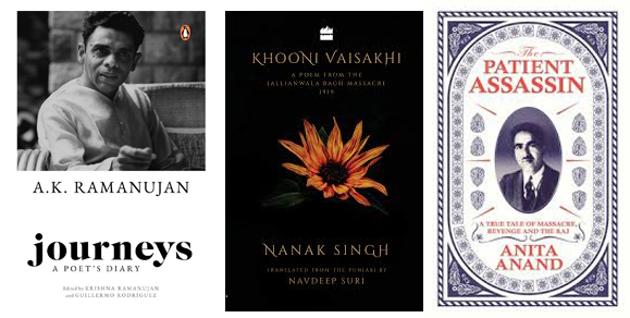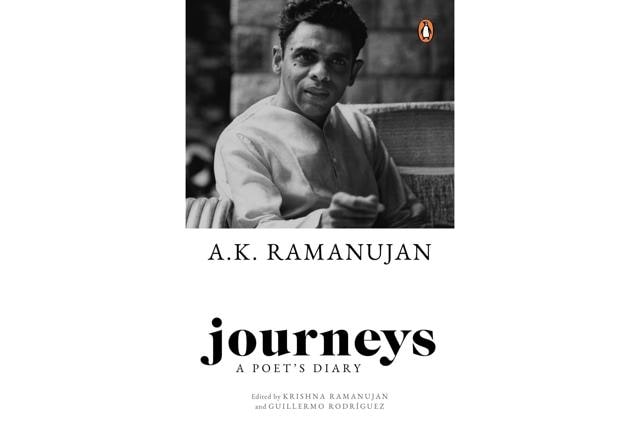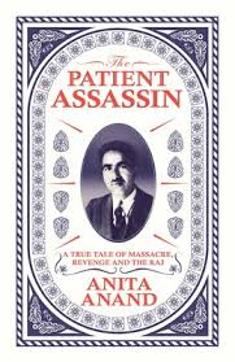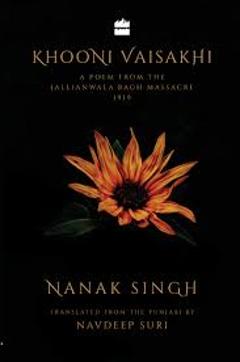HT Picks: The most interesting books of the week
This week’s selection of good reads includes the journals of one of India’s finest poets and folklorists, a translation of a protest poem on Jallianwala Bagh that was banned in 1920, and a retracing of the life of Udham Singh who assassinated one of the main perpetrators of the Amritsar massacre
AK RAMANUJAN – JOURNEYS; A POET’S DIARY EDITED BY KRISHNA RAMANUJAN AND GUILLERMO RODRIGUEZ


AK Ramanujan (1929-1993) is well known as one of the finest poets, translators, folklorists, essayists and scholars of the twentieth century. His translations of ancient Tamil and medieval Kannada Poetry, as well as of UR Anantha Murthy’s novel Samskara, are considered classics in Indian literature. A pioneering poet, he had produced during his lifetime four poetry collections in English and three in Kannada.
However little is known about the personal material that is contained in the ‘AKR Papers’ a large treasure of literature – journals, diaries, notes – Ramanujan left behind in his prolific career: his literary footprints. He had intended to publish many of these private writings, but never did.
After his premature death in 1993, the Papers – spanning forty-nine years from 1944 to 1993 – were given by his family to the Special Collections Research center at the Joseph Regenstein Library of the University of Chicago in June 1994.
Edited by Krishna Ramanujan and Guillermo Rodriguez, Journeys offers access to Ramanujan’s hitherto unpublished personal diaries and journals from the Papers – meticulously preserved at the University of Chicago – shining new light on his creative process. It includes accounts from his travels, his thoughts on writing many improvised as well as early poetry drafts, and dreams – the fertile grounds where the seeds for much of his later published work were planted.*
THE PATIENT ASSASSIN BY ANITA ANAND

On 13 April 1919, thousands of civilians gathered peacefully in Jallianwala Bagh, a walled garden in Amritsar. In the eyes of both the lieutenant governor of Punjab, Sir Michael O’Dwyer, and his top military man in the city, Brigadier General Dyer, such gatherings were proof that a second Indian mutiny was brewing in the province. Dyer decided to use the meeting to teach the natives a lesson. Blocking the main exit with armoured cars, he marched in with his men and commanded them to fire without giving any order to disperse.
In the murderous ten minutes that followed hundreds fell dead, and many more were wounded
According to legend, Udham Singh was among the injured that day and, picking up a handful of blood-soaked earth, he vowed to take revenge on those responsible. More than twenty years later in a Westminster hall, he gunned down O’Dwyer in cold blood to fulfill that promise. His actions made him a martyr in India and, to this day, his name is revered.
But what happened in the intervening years? In this sweeping narrative that takes the reader across four continents, Anita Anand separates reality from myth to reveal Singh’s astonishing story. She brilliantly pieces together his movements and the people who inspired and helped him, discovering surprising new links that take us from Jazz Age New York to the shady world of international spy rings, from poverty-stricken London bedsits to movie sets. The Patient Assassin shines a devastating light on one of the Raj’s most horrific events, but reads like a taut thriller as Singh’s moment of destiny draws ever nearer.*
KHOONI VAISAKHI BY NANAK SINGH, TRANSLATED BY NAVDEEP SURI

Twenty-two-year-old Nanak Singh joins the mass of peaceful protestors agitating against the Rowlatt Act. What then turns out to be one of the worst atrocities perpetrated by the British Raj, and a turning point in India’s independence movement, also becomes a life-changing experience for Nanak Singh, who survives the massacre, unconscious and unnoticed among the hundreds of corpses.
After going through the traumatic experience, Nanak Singh proceeds to write Khooni Vaisakhi, a long poem in Punjabi that narrates the political events in the run-up to the massacre and its immediate aftermath. The poem was a scathing critique of the British Raj and was banned soon after its publication in May 1920. After sixty long years, it was rediscovered and has been translated into English for the first time by the author’s grandson, Navdeep Suri.
Watch:
Featuring the poem in translation and in original, this bilingual book also has essays by Navdeep Suri, Punjabi literature scholar HS Bhatia and BBC correspondent Justin Rowlatt. This commemorative edition of Khooni Vaisakhi is not only a poignant piece of protest literature but also a historical artifact and a resurrected witness to how Sikhs, Hindus and Muslims came together to stand up to colonization and oppression in one of India’s darkest moments. *
*All text from book flap






